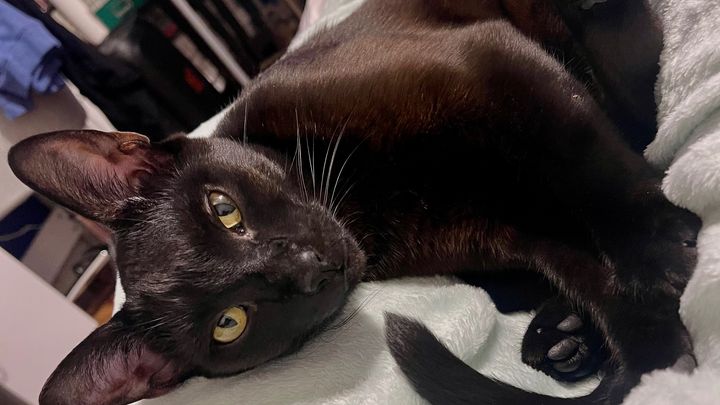
Help Milo Breathe Easier
Donation protected
My partner and I adopted our 1-year-old cat Milo from a shelter in Brooklyn, NY, in February 2025. He originally came from a shelter in Georgia. Milo was the quieter and more timid cat, often hiding in the corner of the kennel. After losing our 13-year-old dog and 8-year-old cat in the past three years, we thought long and hard about adopting. However, once we saw Milo, he won us over. We filled out the paperwork and brought Milo to his forever home the same day.
It took some time for him to adjust, but we supported him every step of the way, reassuring him with love that he was in good hands. Soon, Milo warmed up to his new home and family. He enjoys playing with feathers, getting pets on his back, receiving kisses on the forehead, and being around when we're getting ready for the day. He loves love. He is nothing like the shy cat we first saw.
When we adopted Milo, we were informed that he was a healthy cat with no signs of health complications. We also received paperwork showing he was up to date on vaccinations and tested negative for several conditions. However, a few months later, we noticed Milo wheezing as if he were trying to cough up a hairball. Concerned, we took him to the vet in April 2025, where we learned he had roundworms. The vet prescribed medication to treat the issue, advising us to follow up with two more doses to “flush them out,” which should relieve his wheezing. Despite this, Milo remained his energetic self, running from room to room and eagerly jumping up for kisses and pets. While the wheezing subsided temporarily, it eventually returned.
On July 1, 2025, we woke up to find that Milo had thrown up a significant amount and was lethargic. He refused to eat and turned down his favorite treats, which he normally gobbles up eagerly. He soon began showing signs of distressed breathing, prompting us to rush him to the emergency room. Radiographs were taken, and he was placed in an oxygen incubator to assist with his breathing. The radiographs revealed that while his heart appeared fine, his lungs were concerning. Given his history with worms, the vet suggested the possibility of heartworms. Milo was quickly transferred to another emergency facility for more tests and to see a cardiologist. We were informed he would need hospitalization for continuous monitoring and oxygen support; otherwise, he might not survive.
On July 2, 2025, Milo was moved to the ICU, where he was scheduled to see the cardiologist for further exams. Upon testing, he was found to be positive for adult heartworms, which is rare in cats. An echocardiogram showed that while his heart seemed normal, his lungs had sustained damage due to the adult heartworms. We learned that heartworms, typically transmitted by mosquitoes from the South, cause inflammation in the lungs and can lead to clots. Milo is symptomatic for heartworms.
Unfortunately, there is no direct treatment for heartworms in cats. The plan is to start him on preventive treatment and hope his body can fight off the heartworms naturally. Milo is receiving oxygen and has his breathing monitored continuously.
Milo’s prognosis is guarded, with a 50/50 chance of recovery. We remain hopeful that he will recover and return to being the fun, lovable cat he has become in our home. We are kindly asking for any assistance you can provide to help cover the costs of the necessary exams of his lungs for this rare case and to keep him on oxygen. Your support will also assist us with any post-treatment needs (but like the vet said “one step at a time” we have to focus on him breathing on his own before entering treatment.) We will continue to update everyone on Milo’s journey. Any help would be greatly appreciated.
Organizer
Cindy Andrade
Organizer
New York, NY